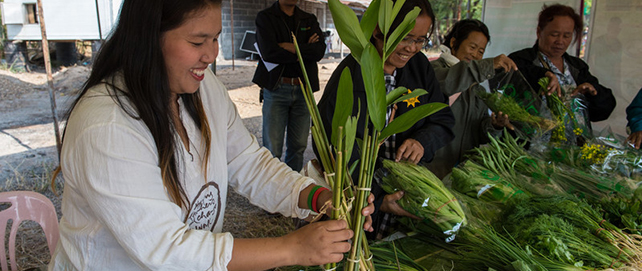

Thailand has made remarkable development progress, and recently attained upper-middle-income status. The country has dramatically reduced poverty and greatly improved its social services. Despite an economic slowdown in recent years, Thailand remains the second-largest economy in Southeast Asia. The country actively promotes GMS cooperation and integration, and is a crucial partner for the less-developed GMS countries. It recently embarked on widespread economic and policy reforms under “Thailand 4.0” and guided by the 20-Year National Strategy, 2017–2036. The national strategy will help address inequalities and achieve sustainable development by seeking to (i) enhance and develop the potential of human capital, (ii) ensure justice and reduce social disparities, (iii) strengthen the economy and enhance competitiveness on a sustainable basis, (iv) promote green growth for sustainable development, (v) bring about national stability for national development toward prosperity and sustainability, and (vi) enhance the efficiency of public sector management and promote good governance.
Quick Facts
| Population | 69.67 million (2020) |
| Average Annual Population Growth Rate | 0.5% (2015-2020) |
| GDP at PPP (current international dollars) | 1,272.9 billion (2020) |
| GDP per capita at PPP (current international dollars) | 18,312 (2020) |
Agriculture
Thailand’s fertile lands and advanced farming systems have made it the biggest agricultural producer and exporter in the GMS. The country is renowned worldwide for the quality of its rice, pineapples, dried fruits, and aquatic products; and it is a leading global supplier of rubber. The government is making strides to improve food safety and promote organic farming. Thailand actively shares its agriculture expertise with its GMS partners; and its agribusiness companies are major investors in the subregion as well.
Energy
Thailand has extensive energy resources such as oil, coal, and natural gas. However, due to a high domestic demand, it relies heavily on energy imports, such as hydroelectricity from neighboring Lao PDR. Domestic energy demand is forecast to increase dramatically in the coming decades, so Thailand is looking to secure its energy future by diversifying its power mix away from fossil fuel sources. The country is already a GMS leader in renewables, and is aiming to scale up its energye‹ciency programs. Another priority is lessening the environmental footprint of its energy sector
Environment
Although Thailand has extensively tapped into its natural resource base to spur economic development, the country still has abundant water, forest, fish, and wildlife resources. Following devastating floods in 2011, the government responded by prioritizing water management and flood prevention. Thailand is also exploring low-carbon development pathways such as “green freight” transport and environmentally friendly energy sources, including solar power. Cambodia and Thailand have recently initiated efforts to jointly protect important natural forests along their common borders.
Human Resource Development and Health
Human resource development will play a key role in Thailand’s achieving its goal of higher-income status by 2032. In recognition of this, enhancing human capital is at the center of the country’s 20-Year National Strategy, 2017–2036. Thailand is actively working with its GMS partners to improve education and address human tracking issues. The country is also leading subregional cooperation on cross-border migrant health issues, including disease control. Addressing antimicrobial resistance and improving road safety are two other national health priorities.
Information and Communication Technology
Thailand is a GMS leader in ICT, with an extensive telecommunications network and widespread penetration of internet and phone services. The country is actively pursuing its vision of a “digital economy” that will spur productivity and competitiveness. Steps toward this goal include rolling out 4G wireless broadband infrastructure and promoting the use of ICT by businesses, both large and small. The country hopes to provide 40 million citizens with internet access by 2018.
Tourism
Thailand has long been a major tourist destination, and these days it is one of the most visited countries in the world. With its shopping, cuisine, and vibrant urban setting, Bangkok is hugely popular. Many visitors also enjoy other destinations, including the ancient capital Ayutthaya, Khao Yai National Park, the northern city of Chiang Mai, and the pristine beaches of islands such as Phuket and Samui. Thailand’s tourism priorities include developing quality services that appeal to higher-spending markets, promoting their culture, and ensuring environmental sustainability.
Transport
Thailand has well-developed basic infrastructure for air, land, and water transport. Its paved road network is extensive—over 200,000 kilometers—while railway connectivity will soon be upgraded with dual tracks throughout the country. In Bangkok, the “Skytrain” and underground metro system are being upgraded to address urban transport challenges. Thailand is looking to further modernize and expand its transport infrastructure. One major focus is rail, especially high-speed trains, with the intention of making Thailand into a trade hub for the GMS and countries beyond. Another priority is upgrading more roads to four-lane highways.
Transport and Trade Facilitation
Thailand conducts a lot of trade within the GMS. Its products such as rice, rubber, electrical appliances, and vehicles are exported throughout the subregion—and all over the world. Sea transport plays a major role in connecting Thailand with global markets, while road, rail, and air move goods and people within the subregion. As a quarter of its trade is intra-GMS, Thailand is a vitally important trading partner for the other countries in the subregion. Cooperating with its GMS partners, Thailand has simplified its procedures for cross-border trade and transport. It is also working to enhance its position as a logistics hub for the subregion.
Urban Development
Thailand is the most urbanized country in the GMS, with just over half of the population living in towns and cities. Bangkok is the country’s largest city, and an international hub for trade and travel. With most of Thailand’s urban centers boasting high-quality roads and other infrastructure, the focus in recent years has been on improving environmental sustainability and enhancing economic opportunities. The country’s 10 special economic zones and 100+ industrial zones have helped drive employment and trade in many secondary towns and cities, including those in border areas near Cambodia, the Lao PDR, Malaysia, and Myanmar.
GMS Program Officials and Contacts in Thailand
- Danucha PICHAYANAN (Mr)
National Coordinator Secretary General Office of the National Economic and Social Development Council - Vudhidej CHAMNIKIJ (Mr)
Plan and Policy Analyst International Coordination Office National Economic and Social Development Council
